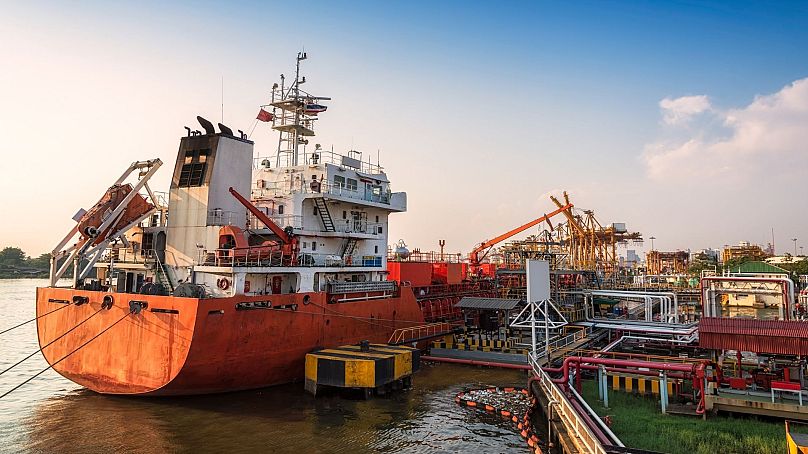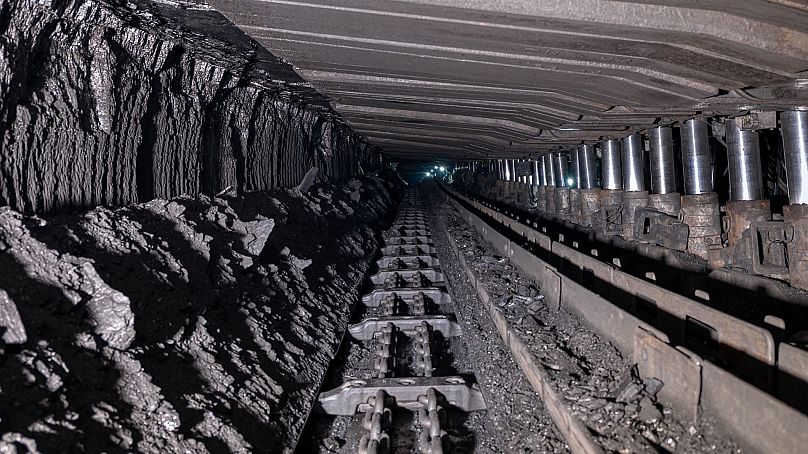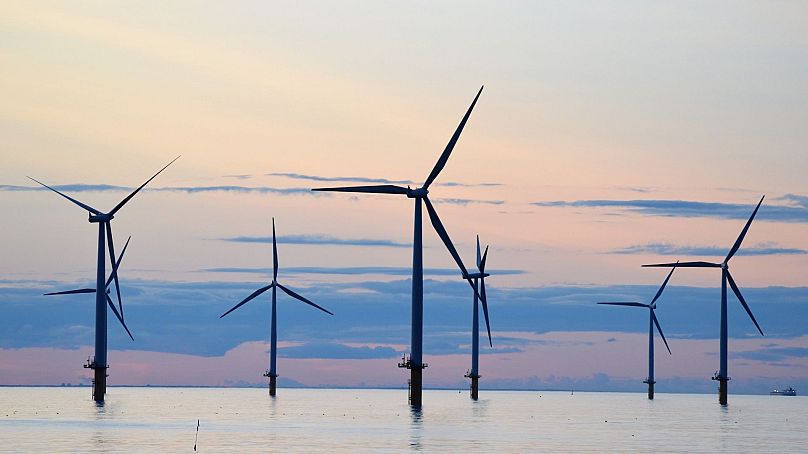If coal plants are reopened in the EU, we can say goodbye to reaching the net zero targets the bloc has promised to reach.
The European Union has spent the last few months imposing sanctions on Russia, from travel bans to asset freezes, alongside other western nations like the US and the UK. And while these impacted Russia more indirectly, many said the measures didn't go far enough - conveniently missing out one very important element - gas.
 ADVERTISEMENT
ADVERTISEMENT
 ADVERTISEMENT
ADVERTISEMENT
Now the EU has announced that it plans to slash Russian gas imports by two-thirds in response to the war in Ukraine. The aim is to significantly reduce reliance on Russian natural gas coming into the bloc by 2023.
In the same week, US President Joe Biden imposed an immediate ban on Russian oil and other energy imports and the UK said it would phase out imports by the end of 2022.
"It’s hard, bloody hard, but it’s possible if we’re willing to go further and faster than we’ve done before," said Frans Timmermans, the vice-president in charge of the EU Green Deal.
The decision was made after fears that European demand for gas may be bankrolling the war in Ukraine.
"When Europe is so dependent on [gas] from Russia, it gives him [Putin] a lot of money. This money has now been spent on transporting troops from Russia to Ukraine's borders," says Sergiy, a Kyiv-based Extinction Rebellion Ukraine member.
Leaders in Europe know that moving away from fossil fuels is a priority in the coming years, if we’re going to limit global warming to below 1.5C compared to pre-industrial levels.
Yet, until now, the bloc has continued to pay Russia for oil and gas - non-renewable fuels which produce vast amounts of toxic air and water pollution and make up the largest source of greenhouse gas emissions.
Around 40 per cent of Europe's oil and gas is imported from Russia and Germany is one of the most reliant EU states.
In late February, the country announced the cancellation of the €9.9 billion Nord Stream 2 gas pipeline from Russia - which is good news environmentally, yet may not hurt Russia quickly enough as the pipeline was not operating yet.
But now that the price of oil has topped $140 (€129) per barrel for the first time since 2008, and gas imports are set to reduce in the coming years, governments are scrambling to find energy alternatives.
Brussels is stepping up efforts to rapidly diversify its basket of energy providers and is reaching out to other gas exporters such as the US, Norway, Qatar, Azerbaijan, Algeria, Egypt, Turkey, Japan and South Korea.
But is gas the only option?
What are the alternatives to Russian gas in Europe?
In March, energy ministers met in Brussels to discuss how to break the dependency.
"We have to prepare for all possibilities," said France's ecological transition minister, Barbara Pompili, at the session. The EU has sufficient gas and oil stocks to withstand short-term disruption, she said, "however, there is an issue on long-term supplies".
The ministers also discussed assisting Ukraine's energy sector by accelerating a planned link of Ukraine's electricity grid with Europe's, which would make it more independent from Russia.
The crisis shows that moving away from imported fossil fuels is not just important in the fight against climate change, but as a matter of security.
Here are a few alternative options EU states will have to consider:
LNG (liquefied natural gas)
Gas is a bigger problem than oil in Europe and, although winter is coming to an end, there is still a demand for imports. And Norway, Europe’s second largest supplier after Russia, is already operating at maximum capacity.
Now that the EU is slashing Russian imports, European countries may have to divert more ships of LNG in their direction, coming from the US. Although LNG is regarded as the cleanest of the fossil fuels, it is a fossil fuel nonetheless and therefore contributes towards irreversible climate damage.
While this may fill a gap in the short-term, experts say there is not enough LNG to meet all of Europe’s energy needs. In the US they are trying to buy non-Russian natural gas from other parts of the world to keep up with demand.
Germany is specifically looking to import LNG from Qatar and buy gas from other European nations. Europe’s biggest economy may also build two of its own LNG terminals domestically.
Italy is looking into increasing gas supplies from Algeria. Algeria, which has pipelines to Spain and Italy and a large LNG terminal at Skikda, boosted oil and gas output last year by 5 per cent.
This pipeline to Italy could even have spare capacity that could be used to increase supply to Europe as a whole.
Coal
Even more controversially, some predict that the bloc may have to resort to reactivating old, decommissioned coal plants.
Coal is regarded as the worst fossil fuel. It is the dirtiest of them all - responsible for over 0.3C of the 1C increase in global average temperatures - making it the single largest source of global temperature rise. Returning to coal would be catastrophic for the future of our planet.
“Short term it may be that, as a precaution and in order to be prepared for the worst, we have to keep coal-powered plants on standby and maybe even let them operate,” German economy minister Robert Habeck told public radio Deutschlandfunk.
European countries have been gradually decommissioning coal infrastructure in recent years, as the power market moves towards a greener, less carbon-heavy future.
However, as the energy crisis escalates, “coal remains a critical component of the power mix, especially when the reliability of other sources of energy is called into question,” says Carlos Torres Diaz, Head of Gas and Power Markets Research at Rystad Energy.
If Germany reverted to coal, it would go against its own green promise to phase out coal-fired power plants by 2030.
Renewable energy
Now for some good news. Some European leaders are saying that Russia’s invasion of Ukraine is a chance to accelerate the transition to renewables, including nuclear plants.
Germany is aiming to speed up growth of its solar energy plus onshore and offshore wind projects. Economy Minister Robert Habeck, a leading member of the Greens party, said faster expansion of renewables is the key to reducing Germany's dependence on Russian fossil fuels.
Nuclear power is also a clean possibility. Nuclear generation rose by 6 per cent in 2021 compared with 2020 and has been the largest contributor to electricity generation in Europe since 2014. The setback at the moment is that numerous nuclear power plants have reached the end of their life cycles and it is expensive to rebuild them. Their operational lifetime is only around 40 years.
Imports of fuels based on clean hydrogen are also likely to play a role. However, some point out that Europe could be compromised by Russian energy dependence for decades more if it pursues a certain hydrogen route. According to Dr Max Lacey-Barnacle, Research Fellow in Just Transitions in the Science Policy Research Unit (SPRU) at the University of Sussex Business School, Russia is stepping up its hydrogen plans.
“Seeing the emerging market for hydrogen as a vital commercial opportunity, Russia is targeting 20 per cent of the global market share of hydrogen by 2030, with $127 million of investment over the next three years and ambitions to become a world-leading producer and exporter of hydrogen energy,” he explains.
But luckily, Australia is also a potential hydrogen supplier. A new study found South Australia's world class renewable energy resources will give it a competitive edge in the race to supply clean hydrogen to Europe through the port of Rotterdam.
“If we really want to stop long-term making Putin very rich, we have to invest in renewables and we need to do it quickly,” Frans Timmermans, vice-president of the European Commission, said in January.
European Commission President Ursula von der Leyen agreed, adding in a statement, "We must become independent from Russian oil, coal and gas. We simply cannot rely on a supplier who explicitly threatens us."
Will Biden's decision to slash Russian imports affect the US?
“Today I’m announcing the United States is targeting the main artery of Russia’s economy. We’re banning all imports of Russian oil and gas and energy,” President Joe Biden said in a press conference.
“We will not be part of subsidising Putin’s war,” he added.
Although President Biden led the charge on banning gas imports, making the decision before the EU did the same, the impact is not the same in the US. It's much more of a risk for EU countries.
The United States relies far less on Russian crude oil and gas than Europe. In fact, it makes up only 3 per cent of the country's imported supply.
"We import such a smaller percentage of oil from Russia than the Europeans do ... it is very different circumstance," White House Press Secretary Jen Psaki told reporters.
The ban is something that the US can afford to do. Due to the current exchange rate, “the US can afford that, [but] it would be much, much harder for continental Europe,” Cornelia Meyer, Chief Executive Officer of Meyer Resources, told Al Jazeera.
However, Biden's decision to ban imports is still likely to drive prices up and pinch US consumers already seeing increasing energy prices.














